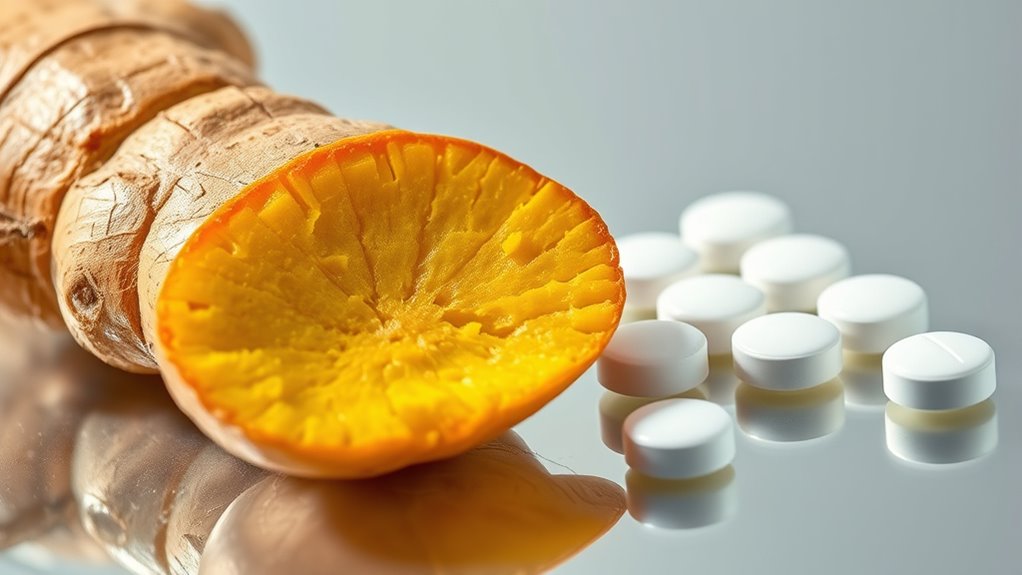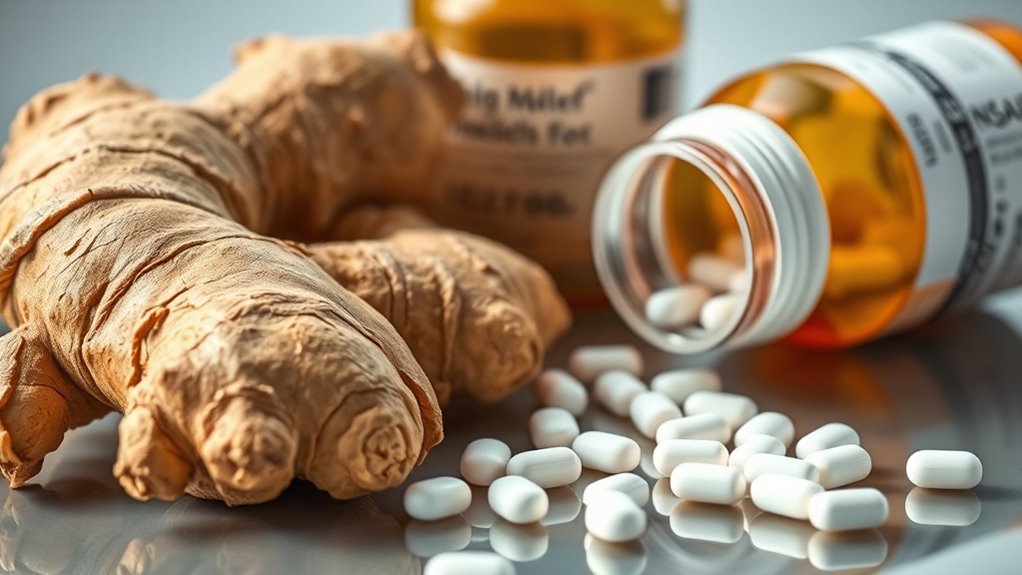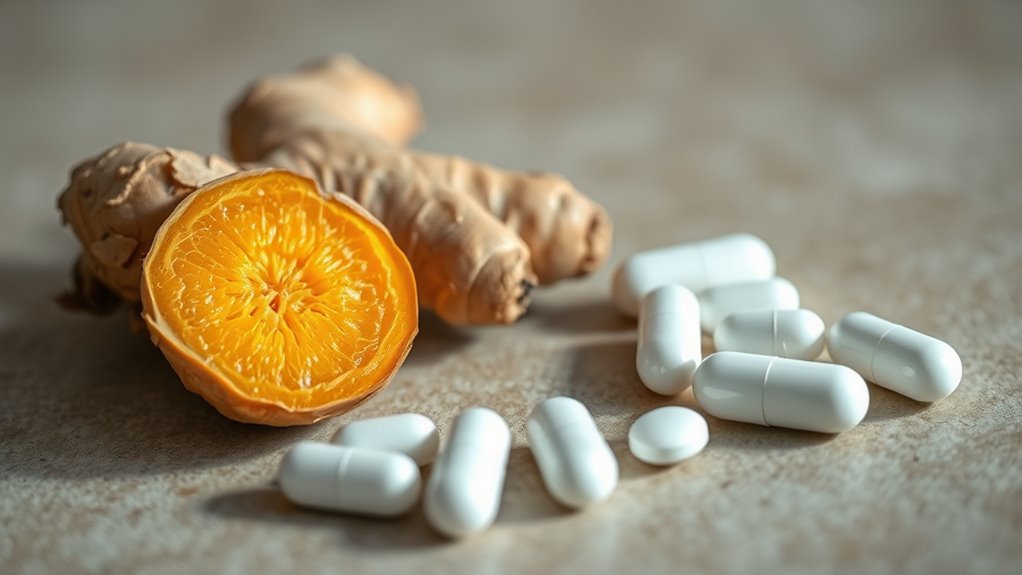Ginger offers a natural, gentle alternative to NSAIDs for pain and inflammation. It works by subtly inhibiting inflammatory pathways and can reduce symptoms over time, making it ideal for long-term use. NSAIDs act fast by blocking enzymes that cause pain and inflammation but can have side effects like stomach issues, kidney problems, and heart risks. To learn how to safely decide between the two and maximize benefits, explore further insights.
Key Takeaways
- NSAIDs provide quick, effective relief for acute pain and inflammation, while ginger’s effects develop gradually over time.
- Ginger acts as a natural anti-inflammatory with fewer gastrointestinal and kidney risks compared to NSAIDs.
- NSAIDs inhibit cyclooxygenase enzymes rapidly, offering immediate pain relief; ginger modulates inflammation through multiple pathways subtly.
- Long-term NSAID use increases risks of gastrointestinal damage, kidney issues, and cardiovascular problems; ginger generally has a safer profile.
- Choosing between them depends on urgency, safety considerations, and long-term health goals, ideally under healthcare provider guidance.
Effectiveness in Alleviating Pain and Inflammation

When comparing ginger and NSAIDs for pain and inflammation relief, ginger often stands out as a natural alternative. Many people turn to holistic approaches and alternative therapies like ginger because they seek options with fewer side effects. Scientific studies suggest ginger can reduce pain and inflammation, especially for conditions like osteoarthritis. Understanding anti-inflammatory properties** can help individuals make more informed choices about natural remedies. Additionally, the anti-inflammatory effects of ginger are supported by its plant-based origins and traditional use in herbal medicine. While NSAIDs are effective and fast-acting, ginger offers a gentle, plant-based remedy that may provide relief over time. Its anti-inflammatory properties make it a remarkable choice for those looking to manage discomfort naturally. The presence of antioxidants and other nutrients in ginger further enhances its health benefits, making it a versatile addition to a pain management strategy. Moreover, some research indicates that ginger may also support immune function**, adding to its overall health-promoting qualities. However, the effectiveness varies from person to person, and some may find ginger less potent than NSAIDs. Overall, ginger’s role in holistic approaches makes it a noteworthy option in the landscape of pain management.
How Ginger Works Compared to NSAIDs

Ginger and NSAIDs relieve pain and inflammation through different biological mechanisms. Ginger’s bioavailability varies depending on its form and preparation, but it primarily works by inhibiting inflammatory pathways and reducing prostaglandin production. This natural approach helps decrease pain without directly damaging tissues. In contrast, NSAIDs are absorbed quickly, allowing them to block cyclooxygenase enzymes (COX-1 and COX-2), which play a key role in inflammation and pain signaling. Their absorption rate leads to rapid relief, but it can also cause side effects. While NSAIDs focus on blocking inflammatory chemicals after they form, ginger modulates inflammation more subtly by influencing multiple pathways. This difference in how they work explains the distinct onset and potential benefits of each. Additionally, understanding the genetic variation in breeds like the black Golden Retriever can inform more personalized approaches to managing inflammation and pain in dogs. Furthermore, ongoing research into AI safety measures underscores the importance of developing safer and more reliable natural remedies for pain management. Recognizing the role of bioavailability is crucial for optimizing the effectiveness of ginger as a therapeutic option, especially considering how different preparations can influence its absorption and efficacy. A comprehensive understanding of bioavailability factors can help tailor treatment strategies for better pain relief outcomes.
Safety Profiles and Potential Side Effects

While both ginger and NSAIDs can effectively reduce pain and inflammation, their safety profiles differ considerably. Ginger is generally well-tolerated but may cause allergy concerns in some individuals, especially those allergic to plants in the same family. It’s also important to contemplate potential drug interactions; ginger can thin blood, so it may enhance the effects of blood-thinning medications, increasing bleeding risks. Ginger’s natural anti-inflammatory properties make it a popular alternative for some users seeking relief without conventional drugs. Its role in payment processing highlights the importance of monitoring interactions and safety in various applications. Additionally, the bioactive compounds in ginger can contribute to its therapeutic effects, but they may also lead to adverse responses in sensitive individuals. Understanding safety considerations is crucial when incorporating herbal remedies like ginger into treatment plans. NSAIDs, on the other hand, carry a higher risk of side effects such as gastrointestinal irritation, ulcers, and kidney issues. They may also interact with other medications like antihypertensives or corticosteroids, leading to adverse effects. Additionally, the influence of AI on music creation has led to the development of new tools that can assist in understanding and predicting drug interactions. Always consult your healthcare provider before starting any new treatment to understand how these options might affect your health based on your unique medical profile.
Long-Term Use and Risks

Long-term use of NSAIDs can lead to gastrointestinal damage, kidney issues, and heart problems, which you should consider carefully. Ginger may pose fewer risks over time, but its long-term effects aren’t fully understood. Understanding these potential dangers helps you make informed decisions about managing pain safely. Additionally, Forsale 100 could influence the availability and options for pain relief products. Being aware of the long-term effects associated with each option allows for better health management and risk mitigation, especially considering the potential side effects associated with prolonged NSAID use. It’s also important to consider the effectiveness of each option for different types of pain to choose the most appropriate treatment.
Potential for Gastrointestinal Damage
Although NSAIDs are effective for pain relief, their prolonged use considerably increases the risk of gastrointestinal damage. You may experience gastrointestinal irritation, which can escalate to more severe issues like stomach ulcers. These risks are especially relevant with long-term use, where repeated exposure weakens the stomach lining. To understand this better, consider the following:
| Risk Factors | Effects |
|---|---|
| Chronic NSAID use | Increased stomach ulcers |
| Pre-existing conditions | Higher likelihood of irritation |
NSAIDs inhibit prostaglandins, protecting the stomach lining, which leads to irritation and ulcers. Ginger, on the other hand, shows a lower risk for gastrointestinal damage, making it a safer option for long-term use.
Risk of Kidney Complications
Prolonged use of NSAIDs can impair kidney function by reducing blood flow and damaging renal tissues, increasing the risk of complications such as chronic kidney disease. This renal risk threatens your kidney health, especially with long-term or high-dose use. Visualize these risks:
- Decreased urine output, signaling compromised kidney filtering.
- Swelling in your ankles or face due to fluid retention.
- Elevated blood pressure from impaired renal regulation.
These signs highlight how NSAIDs can jeopardize kidney health over time. It’s essential to monitor kidney function if you’re using NSAIDs regularly. Ginger, on the other hand, generally presents a lower renal risk, making it a safer option for long-term pain and inflammation management. Being aware of these risks helps protect your renal health and prevent serious complications. Additionally, understanding the cybersecurity vulnerabilities associated with digital health tools can aid in safeguarding your health data. Understanding industry trends can also help you make informed choices about pain management options.
Impact on Heart Health
While NSAIDs can effectively reduce pain and inflammation, their impact on heart health becomes a significant concern with extended use. Long-term use of NSAIDs may increase blood pressure and disrupt your heart rhythm, raising the risk of cardiovascular problems. These medications can cause fluid retention and constrict blood vessels, putting extra strain on your heart. If you already have hypertension or a history of heart issues, regular NSAID use might worsen these conditions. Home security systems can offer peace of mind by protecting your property and loved ones. Indexed annuities offer protection against inflation and can support long-term financial stability. Ginger, on the other hand, has been shown to support heart health by helping to regulate blood pressure and improve circulation. However, always consult your healthcare provider before making changes to your pain management routine, especially if you have existing heart concerns.
Practical Considerations and Usage Tips

When considering ginger as an alternative to NSAIDs, it’s important to understand how to incorporate it effectively into your routine. Start with clear dosage guidelines to avoid overdoing it. For example, you might:
- Choose high-quality ginger supplements from reputable sources to guarantee safety and potency.
- Incorporate fresh ginger into meals or brew it as tea for natural relief.
- Track your response to determine if the dosage is effective without side effects.
Always consult product sourcing details to avoid contaminants or fillers. Using ginger consistently at the right dosage can optimize its benefits. Remember, natural doesn’t always mean risk-free, so follow guidelines and listen to your body. Proper integration ensures you get the most from ginger’s anti-inflammatory properties.
Making an Informed Choice for Your Needs

When choosing between ginger and NSAIDs, consider how well each manages your pain and aligns with your health goals. Think about whether you prefer a natural remedy or a synthetic option, and weigh their safety profiles and potential side effects. Making an informed decision helps you select the best approach for your specific needs.
Effectiveness for Pain
Are ginger and NSAIDs equally effective at relieving pain? Not exactly. NSAIDs often provide quick, noticeable relief for acute pain, especially with joint or muscle issues, while ginger’s effects tend to develop gradually. When considering effectiveness, think about how you prefer to manage pain. Picture these scenarios:
- You’re suffering from chronic inflammation and need a consistent herbal combination.
- You want fast relief without dietary restrictions or side effects.
- You’re exploring options that align with herbal and natural remedies.
NSAIDs are often preferred for immediate results, but ginger can be effective over time, especially if you’re cautious about dietary restrictions. Both can be useful, but your choice depends on your specific needs and how you respond to herbal combinations versus synthetic options.
Natural vs. Synthetic
Choosing between natural and synthetic pain relief options depends on your priorities and health considerations. Natural remedies like ginger and other alternative therapies often appeal because they’re derived from plants and may have fewer chemical additives. They can also be influenced by dietary choices, which can enhance their effectiveness or reduce inflammation. Synthetic options, such as NSAIDs, are manufactured for consistent potency and fast relief but may carry risks of side effects. Your decision should factor in how you prefer to manage pain—whether through holistic, food-based approaches or conventional medications. Keep in mind that dietary influences can play a significant role in how well natural remedies work and how your body responds. Making an informed choice involves weighing these factors carefully, aligning with your health goals and lifestyle.
Safety and Side Effects
Natural remedies like ginger may seem gentler, but it’s important to understand their safety profiles and potential side effects. Ginger can cause allergy risks, especially if you have sensitivities to plants in the same family. Following proper dosage guidelines is essential to prevent adverse effects, such as stomach upset or bleeding risks. Be aware that excessive intake might lead to interactions with medications like blood thinners. Here are some safety considerations:
- Allergy Risks: Watch for symptoms like rash, swelling, or difficulty breathing.
- Dosage Guidelines: Stick to recommended amounts to avoid gastrointestinal issues.
- Side Effect Risks: High doses may increase bleeding tendencies or cause heartburn.
Always consult your healthcare provider before making significant changes to your pain management routine.
Frequently Asked Questions
Can Ginger Replace NSAIDS for Chronic Pain Management?
You might consider ginger as a natural alternative for managing chronic pain, but it’s unlikely to fully replace NSAIDs. While ginger offers long-term safety benefits, it may not be as potent for severe pain or inflammation. Always consult your healthcare provider before switching, as natural remedies like ginger can complement your treatment but shouldn’t replace prescribed medications without guidance. Your safety and effective pain relief come first.
Are There Any Drug Interactions With Ginger or NSAIDS?
Imagine your body as a bustling city, where drug interactions are like traffic jams. Ginger and NSAIDs can interact with other herbal supplements or medications, causing unwanted delays or disruptions. Ginger’s natural compounds might enhance blood thinning, while NSAIDs could increase risks when combined with anticoagulants. Always check with your healthcare provider to avoid these traffic jams, ensuring smooth sailing for your pain relief journey.
How Quickly Do Ginger and NSAIDS Start Relieving Pain?
You’ll notice the onset of action for NSAIDs usually happens within 30 to 60 minutes, providing relatively quick relief time for pain. Ginger, on the other hand, may take longer, often several days of consistent use, to effectively reduce inflammation and pain. If you’re seeking fast relief, NSAIDs are generally more immediate, but ginger might be beneficial for ongoing management over time.
Is Ginger Suitable for Children or Pregnant Women?
You should be cautious with ginger if you’re pregnant or caring for children, as its pediatric safety and pregnancy considerations vary. While ginger is often natural and gentle, it may cause complications or interact with medications in these groups. Always consult your healthcare provider before using ginger, especially during pregnancy or for children, to guarantee safety. Never substitute it without professional guidance, as their well-being depends on proper precautions.
What Are the Costs and Accessibility Differences Between Ginger and NSAIDS?
When comparing costs, ginger is generally more affordable and available as fresh or supplement form, making it accessible for most people. NSAIDs tend to be pricier, especially with long-term use, and may require prescriptions, creating accessibility challenges. You might find ginger easily at local markets or health stores, while NSAIDs can be harder to access in some regions due to pharmacy restrictions or lack of availability.
Conclusion
Choosing between ginger and NSAIDs is like picking between a gentle breeze and a storm—both can ease your pain, but each carries its own risks. By understanding how they work and their safety profiles, you can make an informed decision that suits your needs. Remember, your health is precious—so weigh your options carefully. After all, isn’t it worth finding the right remedy that soothes without causing more storms in your body?










